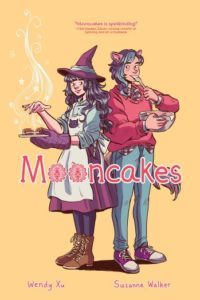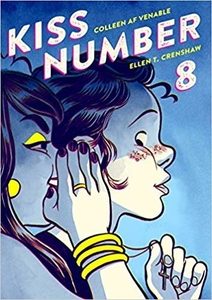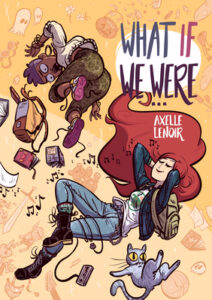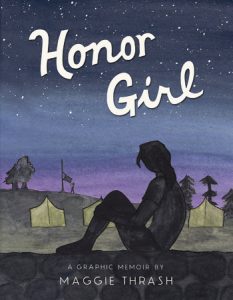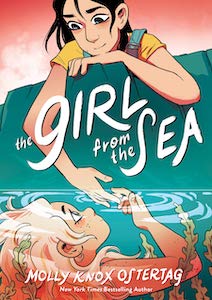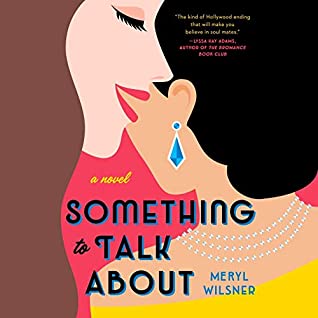Alright, I didn’t really read these while at my job. Contrary to what many seem to believe, library workers don’t actually get to read on the clock (much to our chagrin). But I do see a lot while I am shelving, sorting, shipping, and receiving books, and graphic novels are especially eye-catching. Sometimes I’ll see a book go by and think, “Hey, that looks like it might be gay.” Sometimes I’m able to check it out and see, and sometimes I have to remember to look it up later. The following graphic novels I spotted while working at the library, and actually managed to get around to reading—on my own time, of course. Mostly.
Mooncakes by Suzanne Walker and Wendy Xu is a cute little story about professional witch-in-training Nova Huang and her childhood crush, runaway werewolf Tam Lang, reuniting when an unruly forest demon starts haunting their hometown. It’s all very surface depth—the romance is straightforward and without drama, the characters are likable in very obvious ways, and the story is a basic set-up and knock-down affair that practically advertises its happy ending. That said, the graphic novel is executed clearly and effectively, and it ends with a complete tale all told. A lot of people will be happy with the variety of representation on display here, and for what I think started off as a serial webcomic, Mooncakes isn’t half bad.
I Married My Best Friend to Shut My Parents Up by Kodama Naoko is a short, stand-alone manga, punctuated with what seems to be the first chapter of a completely different manga over halfway through the book. It’s exactly what the title says—serious businesswoman Morimoto Machi enters into a domestic partnership with her lesbian friend Agaya Hana to get her parents to stop pestering her about finding a man. It’s certainly a bit contrived, although the manga does have some rudimentary exploration into the personal and societal forces that might push two people into the titular situation. Overall, though, I found the pacing awkward (it also ends rather abruptly), and the humor a little immature for my tastes. But while I can’t bring myself to call the writing good, it’s at least written with heart. I can see this being someone’s favorite manga, but I personally wouldn’t keep space on my bookshelf for it.
Kiss Number 8 by Colleen AF Venable and Ellen T. Crenshaw is a story about a teenage girl at a Catholic high school grappling with a crush on her best friend, conflicting pressures from her parents and peers, and a long-buried queer history in her own family. I’ll be frank, I did not like this book—largely for personal reasons, though I feel I ought to give a warning in case others might feel the same. A lot in Kiss Number 8 (especially the hook of seven poor kisses with boys, followed by the titular eighth with a girl) lead me to believe that the protagonist’s primary struggle would be that of a lesbian wrestling with compulsory heterosexuality. This is not the case; she is solidly bisexual, and in fact has sex with the brother of the girl she shared her eighth kiss with. This is not a problem in and of itself, but the surprise of it did sour my experience with the graphic novel.
What If We Were… by Axelle Lenoir feels like a cross between a classic graphic novel and a collection of Sunday newspaper comic spreads, a la Calvin and Hobbes. It introduces us to teenage best friends Nathalie and Marie, who pass time imagining themselves as wildly different people in a variety of hilarious situations. This isn’t a metaphor or a rhetorical tool—many pages are just spent on the visual spectacle and humor of this (granted, quite cute and imaginative) game. It was the humor that I found fell somewhat flat; it relies heavily on absurdism and overreaction in a way that just didn’t click for me. The anxious teenage romance between Nathalie and her crush Jane Doe carried the rest of the story, but without it I don’t think I’d have much to say about the writing.
Honor Girl by Maggie Thrash is a graphic memoir recounting the author’s first lesbian crush at an all-girls summer camp in the American South. Honor Girl was the first of these graphic novels that I felt really had something to say, where the pieces all came together to form something greater than the sum of its parts. It’s also just good memoir writing. Autobiography can be hard to nail, but Maggie Thrash has an excellent sense on which details to include and what moments to linger on, and they manage to weave a bittersweet and melancholy story without the sense of contrivance that a too-neat memoir can impart. Some graphic novel aficionados might pass Honor Girl by on account of the rough and raw art style, but if so, they’re missing out.
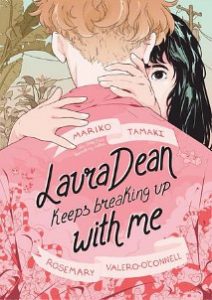
Laura Dean Keeps Breaking Up with Me by Mariko Tamaki and Rosemary Valero-O’Connell is a wonderfully drawn and well-written graphic novel about a bad relationship. Freddy Riley loves Laura Dean, but Laura Dean neglects, isolates, takes for granted, and yes, keeps breaking up with Freddy. Laura Dean Keeps Breaking Up with Me feels layered in a way that the other graphic novels here so far haven’t, and I really liked how the authors would just let certain moments or transitions breathe. That said, this book is never going to be a favorite of mine—and not just because it isn’t a happy romance. The characterization of Laura Dean clearly evokes the imagery of butch lesbians; it’s what makes her so “cool,” so desirable, but it’s also inextricably tied to what makes her a bad girlfriend. This isn’t to say that the story is invalid because I didn’t like how a character was coded; butches can, of course, be bad partners. But considering how poorly masculine women are still treated today, it honestly hurt a little to read Laura Dean Keeps Breaking Up with Me and see such an obvious elevation of queer femininity at their expense.
The Girl From the Sea by Molly Knox Ostertag takes the cake, hands down, as my favorite graphic novel of the bunch. It’s about a closeted teenage lesbian living in a small island town, whose teetering life balance is completely upended with she falls in love with a selkie. Everything I saw the other graphic novels in this list reach for, The Girl From the Sea pulls off. The romance is adorable and sweet, but the characters have their own nuances that keeps it from feeling flat or predictable. The story is tight and well-paced, but there’s enough complexity going on that I don’t feel like a second read-through would be merely perfunctory. The art is great, the humor lands well, and I finished the book wanting more but feeling satisfied with what I had.
Samantha Lavender is a lesbian library assistant on the west coast, making ends meet with a creative writing degree and her wonderful butch partner. She spends most of her free time running Dungeons & Dragons (like she has since the 90’s), and has even published a few adventures for it. You can follow her @RainyRedwoods on both twitter and tumblr.
